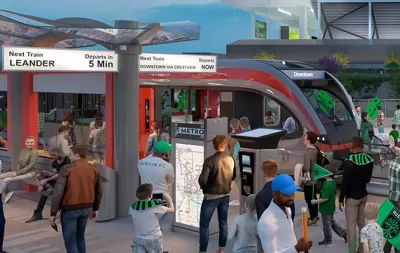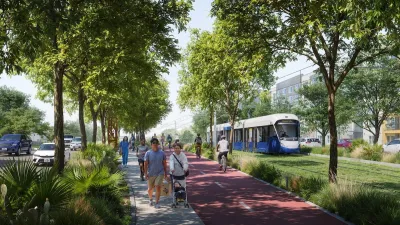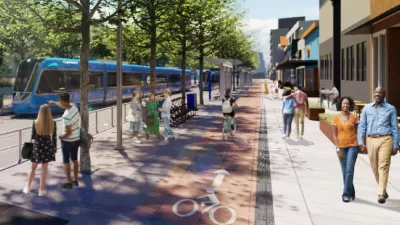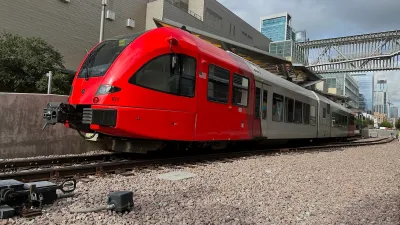The massive transit project’s unique funding scheme could run afoul of state law.

Austin’s Project Connect could be in jeopardy after Texas Attorney General Ken Paxton issued an opinion stating that the project’s “unique financing model is likely illegal,” setting off concerns among supporters of the potentially transformative $7 billion transit investment.
Ryan Autullo outlines the situation in Austin American-Statesman, writing: “Voters approved two things that are at issue in Paxton's opinion: a 20% increase in the city portion of their property tax, and the establishment of a local government corporation to build the system, financed by debt backed by that tax revenue. That tax revenue transfer, according to a city resolution, is to continue indefinitely until funds are no longer required for ‘operations, maintenance, or state of good repair.’”
According to Autullo, “The opinion says Austin is not authorized to pay down debt with the increased maintenance and operation taxes. It also says the tax revenue, about $160 million a year, cannot be transferred to the local government corporation in perpetuity without the ability to terminate at the end of each budget period.” The opinion comes alongside proposed legislation that would require Texans to vote on Project Connect again because the first proposal did not include an approval of new debt.
The city has few options to save Project Connect. “The city could hold a bond election to fund the project, but that would be tricky as the light rail cost is fluid and city leaders would largely be guessing on the amount they'd ask voters to approve.” The city could also use a municipal bond, which “might also spell financial trouble for the city.”
FULL STORY: Ken Paxton raises legal concerns on Austin's financial model for Project Connect

Study: Maui’s Plan to Convert Vacation Rentals to Long-Term Housing Could Cause Nearly $1 Billion Economic Loss
The plan would reduce visitor accommodation by 25,% resulting in 1,900 jobs lost.

North Texas Transit Leaders Tout Benefits of TOD for Growing Region
At a summit focused on transit-oriented development, policymakers discussed how North Texas’ expanded light rail system can serve as a tool for economic growth.

Why Should We Subsidize Public Transportation?
Many public transit agencies face financial stress due to rising costs, declining fare revenue, and declining subsidies. Transit advocates must provide a strong business case for increasing public transit funding.

How to Make US Trains Faster
Changes to boarding platforms and a switch to electric trains could improve U.S. passenger rail service without the added cost of high-speed rail.

Columbia’s Revitalized ‘Loop’ Is a Hub for Local Entrepreneurs
A focus on small businesses is helping a commercial corridor in Columbia, Missouri thrive.

Invasive Insect Threatens Minnesota’s Ash Forests
The Emerald Ash Borer is a rapidly spreading invasive pest threatening Minnesota’s ash trees, and homeowners are encouraged to plant diverse replacement species, avoid moving ash firewood, and monitor for signs of infestation.
Urban Design for Planners 1: Software Tools
This six-course series explores essential urban design concepts using open source software and equips planners with the tools they need to participate fully in the urban design process.
Planning for Universal Design
Learn the tools for implementing Universal Design in planning regulations.
Ascent Environmental
Borough of Carlisle
Institute for Housing and Urban Development Studies (IHS)
City of Grandview
Harvard GSD Executive Education
Toledo-Lucas County Plan Commissions
Salt Lake City
NYU Wagner Graduate School of Public Service





























